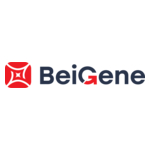- Oral presentation for the ROSEWOOD trial of BRUKINSA in relapsed or refractory follicular lymphoma
- Additional presentations expand existing evidence base for BRUKINSA across B-cell malignancies
BASEL, Switzerland & BEIJING & CAMBRIDGE, Mass.–(BUSINESS WIRE)–BeiGene (NASDAQ: BGNE; HKEX: 06160; SSE: 688235), a global biotechnology company, today announced that it will present data on its Bruton’s tyrosine kinase inhibitor (BTKi) BRUKINSA® (zanubrutinib) at the 17th International Conference on Malignant Lymphoma (ICML), which is taking place from June 13-17 in Lugano, Switzerland.
“The data presented at ICML provide further evidence supporting our confidence in BRUKINSA. Notably, an updated analysis with a median follow-up of 20.2 months, reinforced previous results from the Phase 2 ROSEWOOD trial of BRUKINSA in combination with obinutuzumab,†said Mehrdad Mobasher, M.D., M.P.H., Chief Medical Officer, Hematology. “We recently announced EMA acceptance of our filing for BRUKINSA in combination with obinutuzumab as a treatment for patients with relapsed or refractory follicular lymphoma who received at least two prior lines of therapy; and additional worldwide regulatory submissions are ongoing.â€
In an updated analysis from the Phase 2 ROSEWOOD trial shared as an oral presentation at ICML, BRUKINSA in combination with obinutuzumab demonstrated clinically meaningful activity and was generally well-tolerated in patients with heavily pretreated relapsed or refractory (R/R) follicular lymphoma (FL).
BRUKINSA in combination with obinutuzumab showed an overall response rate of 69.0% versus 45.8% in the obinutuzumab arm (p = 0.0012) and median follow-up of 20.2 months. The complete response rate for BRUKINSA in combination with obinutuzumab was 39.3% compared to 19.4% for obinutuzumab alone. Non-hematologic treatment-emergent adverse events of any grade that occurred more frequently (>5% difference) in the combination group were petechiae (6.3% vs. 0%) and herpes zoster infection (6.3% vs. 0%); in contrast, pyrexia (13.3% vs. 19.7%) and infusion-related reaction (2.8% vs. 9.9%) occurred more frequently in patients receiving obinutuzumab alone.
These results will be presented on June 16, 2023, 3:30 – 5:00 pm CEST. (Abstract #81)
Demonstrating a commitment to developing rigorous evidence for potential new treatments for rare hematologic malignancies, BeiGene will detail the trial design of its Phase 3 MAHOGANY study (NCT05100862) of BRUKINSA plus obinutuzumab versus lenalidomide plus rituximab in R/R FL or marginal zone lymphoma in an oral presentation during the Ongoing Trials Session. (Abstract #994)
Additional Data Further Demonstrate Safety and Efficacy Profile for BRUKINSA
At a median follow-up of 43.7 months, extended follow-up data from the pivotal Phase 3 SEQUOIA study (NCT03336333) showed BRUKINSA efficacy was maintained in patients with treatment-naïve CLL/SLL without del(17p) and patients with del(17p) receiving BRUKINSA continued to show progression-free survival (PFS) benefit consistent with the randomized cohort. Rates of atrial fibrillation remained low, and no new safety signals were identified. BRUKINSA continues to be well tolerated over time, with low rates of treatment discontinuation. (Abstract #154)
In a subgroup analysis of the Phase 3 ALPINE trial (NCT03734016), BRUKINSA showed improved PFS over ibrutinib in patients in China with R/R chronic lymphocytic leukemia or small lymphocytic lymphoma (CLL/SLL), consistent with the global study population. A favorable safety profile was also observed with BRUKINSA compared with ibrutinib, with lower rates of treatment discontinuations and serious adverse events. (Abstract #592)
Preliminary results for the CLL/SLL subgroup of an ongoing Phase 2 trial (NCT04116437) evaluating BRUKINSA in patients with various previously treated with B-cell malignancies who are intolerant to ibrutinib and/or acalabrutinib, demonstrated that treatment with BRUKINSA was well-tolerated and unlikely to lead to recurrence of intolerant adverse events experienced with prior BTK-inhibitor therapy, suggesting BRUKINSA may be a treatment option for these patients. (Abstract #345)
Initial findings from a Phase 2 trial (NCT03824483) of long-term follow-up of BRUKINSA, obinutuzumab and venetoclax (BOVen) demonstrated high rates of durable undetectable minimal residual disease (MRD) in CLL/SLL patients administered BOVen. Of the 46 patients meeting MRD criteria to cease treatment, median time from end of treatment to MRD conversion was 29.8 months. The most common grade ≥3 adverse events were neutropenia (23.1%), thrombocytopenia (7.7%), lung infection (5.8%) (Abstract #153)
More details on BeiGene’s abstracts are available in the ICML online program.
About BRUKINSA® (zanubrutinib)
BRUKINSA is a small molecule inhibitor of Bruton’s tyrosine kinase (BTK) discovered by BeiGene scientists that is currently being evaluated globally in a broad clinical program as a monotherapy and in combination with other therapies to treat various B-cell malignancies.
BRUKINSA is supported by a broad clinical program which includes more than 4,900 patients in 35 trials across 29 markets. To date, BRUKINSA is approved in more than 65 markets around the world, including the United States, China, the European Union, Great Britain, Canada, Australia, South Korea, and Switzerland. The product information may differ from country to country. Prescribers should consult the product information approved in their respective country.
IMPORTANT U.S. SAFETY INFORMATION FOR BRUKINSA (ZANUBRUTINIB)
Warnings and Precautions
Hemorrhage
Fatal and serious hemorrhage has occurred in patients with hematological malignancies treated with BRUKINSA monotherapy. Grade 3 or higher hemorrhage, including intracranial and gastrointestinal hemorrhage, hematuria and hemothorax have been reported in 3.6% of patients treated with BRUKINSA monotherapy in clinical trials, with fatalities occurring in 0.3% of patients. Bleeding of any grade, excluding purpura and petechiae, occurred in 30% of patients.
Bleeding has occurred in patients with and without concomitant antiplatelet or anticoagulation therapy. Coadministration of BRUKINSA with antiplatelet or anticoagulant medications may further increase the risk of hemorrhage.
Monitor for signs and symptoms of bleeding. Discontinue BRUKINSA if intracranial hemorrhage of any grade occurs. Consider the benefit-risk of withholding BRUKINSA for 3-7 days pre- and post-surgery depending upon the type of surgery and the risk of bleeding.
Infections
Fatal and serious infections (including bacterial, viral, or fungal infections) and opportunistic infections have occurred in patients with hematological malignancies treated with BRUKINSA monotherapy. Grade 3 or higher infections occurred in 24% of patients, most commonly pneumonia (11%), with fatal infections occurring in 2.9% of patients. Infections due to hepatitis B virus (HBV) reactivation have occurred. Consider prophylaxis for herpes simplex virus, pneumocystis jirovecii pneumonia, and other infections according to standard of care in patients who are at increased risk for infections. Monitor and evaluate patients for fever or other signs and symptoms of infection and treat appropriately.
Cytopenias
Grade 3 or 4 cytopenias, including neutropenia (22%), thrombocytopenia (8%) and anemia (7%) based on laboratory measurements, developed in patients treated with BRUKINSA monotherapy. Grade 4 neutropenia occurred in 11% of patients, and Grade 4 thrombocytopenia occurred in 2.8% of patients.
Monitor complete blood counts regularly during treatment and interrupt treatment, reduce the dose, or discontinue treatment as warranted. Treat using growth factor or transfusions, as needed.
Second Primary Malignancies
Second primary malignancies, including non-skin carcinoma, have occurred in 13% of patients treated with BRUKINSA monotherapy. The most frequent second primary malignancy was non-melanoma skin cancer reported in 7% of patients. Other second primary malignancies included malignant solid tumors (5%), melanoma (1.2%), and hematologic malignancies (0.5%). Advise patients to use sun protection and monitor patients for the development of second primary malignancies.
Cardiac Arrhythmias
Serious cardiac arrhythmias have occurred in patients treated with BRUKINSA. Atrial fibrillation and atrial flutter were reported in 3.7% of 1550 patients treated with BRUKINSA monotherapy, including Grade 3 or higher cases in 1.7% of patients. Patients with cardiac risk factors, hypertension, and acute infections may be at increased risk. Grade 3 or higher ventricular arrhythmias were reported in 0.2% of patients.
Monitor for signs and symptoms of cardiac arrhythmias (e.g., palpitations, dizziness, syncope, dyspnea, chest discomfort), manage appropriately, and consider the risks and benefits of continued BRUKINSA treatment.
Embryo-Fetal Toxicity
Based on findings in animals, BRUKINSA can cause fetal harm when administered to a pregnant woman. Administration of zanubrutinib to pregnant rats during the period of organogenesis caused embryo-fetal toxicity, including malformations at exposures that were 5 times higher than those reported in patients at the recommended dose of 160 mg twice daily. Advise women to avoid becoming pregnant while taking BRUKINSA and for 1 week after the last dose. Advise men to avoid fathering a child during treatment and for 1 week after the last dose. If this drug is used during pregnancy, or if the patient becomes pregnant while taking this drug, the patient should be apprised of the potential hazard to a fetus.
Adverse Reactions
In this pooled safety population, the most common adverse reactions, including laboratory abnormalities, in ≥30% of patients who received BRUKINSA (N=1550) included decreased neutrophil count (42%), upper respiratory tract infection (39%), decreased platelet count (34%), hemorrhage (30%), and musculoskeletal pain (30%).
Drug Interactions
CYP3A Inhibitors: When BRUKINSA is co-administered with a strong CYP3A inhibitor, reduce BRUKINSA dose to 80 mg once daily. For coadministration with a moderate CYP3A inhibitor, reduce BRUKINSA dose to 80 mg twice daily.
CYP3A Inducers: Avoid coadministration with strong or moderate CYP3A inducers. Dose adjustment may be recommended with moderate CYP3A inducers.
Specific Populations
Hepatic Impairment: The recommended dose of BRUKINSA for patients with severe hepatic impairment is 80 mg orally twice daily.
U.S. INDICATIONS
BRUKINSA is a kinase inhibitor indicated for the treatment of adult patients with:
- Chronic lymphocytic leukemia (CLL) or small lymphocytic lymphoma (SLL)
- Waldenström’s macroglobulinemia (WM)
- Mantle cell lymphoma (MCL) who have received at least one prior therapy
- Relapsed or refractory marginal zone lymphoma (MZL) who have received at least one anti-CD20-based regimen
The MCL and MZL indications are approved under accelerated approval based on overall response rate. Continued approval for these indications may be contingent upon verification and description of clinical benefit in confirmatory trials.
Please see full U.S. Prescribing Information at www.beigene.com/PDF/BRUKINSAUSPI.pdf and Patient Information at www.beigene.com/PDF/BRUKINSAUSPPI.pdf
About BeiGene
BeiGene is a global biotechnology company that is discovering and developing innovative oncology treatments that are more affordable and accessible to cancer patients worldwide. With a broad portfolio, we are expediting development of our diverse pipeline of novel therapeutics through our internal capabilities and collaborations. We are committed to radically improving access to medicines for far more patients who need them. Our growing global team of more than 9,400 colleagues spans five continents, with administrative offices in Beijing, China; Cambridge, U.S.; and Basel, Switzerland. To learn more about BeiGene, please visit www.beigene.com and follow us on Twitter at @BeiGeneGlobal.
Forward-Looking Statements
This press release contains forward-looking statements within the meaning of the Private Securities Litigation Reform Act of 1995 and other federal securities laws, including statements regarding BeiGene’s advancement, anticipated clinical development, regulatory submissions and commercialization of zanubrutinib; and BeiGene’s plans, commitments, aspirations, and goals under the heading “About BeiGene.†Actual results may differ materially from those indicated in the forward-looking statements as a result of various important factors, including BeiGene’s ability to demonstrate the efficacy and safety of its drug candidates; the clinical results for its drug candidates, which may not support further development or marketing approval; actions of regulatory agencies, which may affect the initiation, timing, and progress of clinical trials and marketing approval; BeiGene’s ability to achieve commercial success for its marketed medicines and drug candidates, if approved; BeiGene’s ability to obtain and maintain protection of intellectual property for its medicines and technology; BeiGene’s reliance on third parties to conduct drug development, manufacturing, and other services; BeiGene’s limited experience in obtaining regulatory approvals and commercializing pharmaceutical products and its ability to obtain additional funding for operations and to complete the development and commercialization of its drug candidates and achieve and maintain profitability; and the impact of the COVID-19 pandemic on BeiGene’s clinical development, regulatory, commercial, manufacturing, and other operations, as well as those risks more fully discussed in the section entitled “Risk Factors†in BeiGene’s most recent quarterly report on Form 10-Q, as well as discussions of potential risks, uncertainties, and other important factors in BeiGene’s subsequent filings with the U.S. Securities and Exchange Commission. All information in this press release is as of the date of this press release, and BeiGene undertakes no duty to update such information unless required by law.
Contacts
Investors:
Kevin Mannix
+1 240-410-0129
[email protected]
Media:
Maryline Iva
+ 41 61 685 2090
[email protected]








